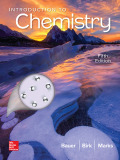
Concept explainers
Interpretation:
The characteristics of molecule that changes in magnitude from one state to another and is largely responsible for a compound to be gas, liquid, or solid is to be stated.
Concept Introduction:
Solid is a
The liquid is a state of matter in which molecules are packed loosely than that in solid and they are able to move around. That’s why liquids are able to take the shape of its container. For example, water and alcohol.
Gas is a state of matter in which molecules are spread all over the space with very high kinetic energy leading to undefined shape and undefined volume and hence, can be easily compressed. For example, oxygen and nitrogen.
Want to see the full answer?
Check out a sample textbook solution
Chapter 10 Solutions
EBK INTRODUCTION TO CHEMISTRY
- give the products for each of the followingarrow_forwardProvide the products and/or reagents for the following transformations. NaOMe HCl/EtOH OH NaOMe CI Show the product for the formation of the ketal given below for the transformation, showing all intermediates and resonance structures would be required to transform the ketal back to the starting ketone and then the mechanism What reagents/conditions HCI EtOH (excess)arrow_forwardMake meta-dibromobenze from nitrobenzene using amine reactions. *see imagearrow_forward
- Provide the structure of the expected major and minor (if any) products for each reaction. Clearly indicate stereochemistry where warranted. + + heat heat 이요 HNO3 1. AlCl3 2. H₂O H2SO4 1. AlCl3arrow_forward) Give the mechanism for the acid catalyzed hydrolysis of the following to the corresponding carboxylic acid. Show all intermediates and resonance structures N H+, H2O (excess)arrow_forward# 2. Drow full structures of the organic product expected in each of the following reactions. Draw the appropriate stereoisomer where warranted! Tos Cl O C NaCN PCC శ్రీ CI TSCI Pyridine H₂CrO4 PBrj Pyridine NaCNarrow_forward
- PLEASE help. Locate a literature IR spectrum of eugenol. Insert the literature spectrum here: What conclusions can you draw about your clove oil from these IR spectra? I attached my data belowarrow_forwardplease help and the percent recovery of clove oil from cloves is 4.61% and i have attached my ir spectrum as well. Based on your GC data, how many components are in the clove oil? Calculate the percentage of each component. Clearly show your work. Which of the components corresponds to eugenol? How do you know? Is eugenol the major component?arrow_forwardplease help and i am so confused if the picture is the gc data or ir spectrum. you dont have to do everything just what you can please because i am lost and the mass of the cloves was Mass of cloves 62.299g. Mass of recovered clove oil 62.761g.arrow_forward
 Organic Chemistry: A Guided InquiryChemistryISBN:9780618974122Author:Andrei StraumanisPublisher:Cengage Learning
Organic Chemistry: A Guided InquiryChemistryISBN:9780618974122Author:Andrei StraumanisPublisher:Cengage Learning World of Chemistry, 3rd editionChemistryISBN:9781133109655Author:Steven S. Zumdahl, Susan L. Zumdahl, Donald J. DeCostePublisher:Brooks / Cole / Cengage Learning
World of Chemistry, 3rd editionChemistryISBN:9781133109655Author:Steven S. Zumdahl, Susan L. Zumdahl, Donald J. DeCostePublisher:Brooks / Cole / Cengage Learning General, Organic, and Biological ChemistryChemistryISBN:9781285853918Author:H. Stephen StokerPublisher:Cengage Learning
General, Organic, and Biological ChemistryChemistryISBN:9781285853918Author:H. Stephen StokerPublisher:Cengage Learning Introductory Chemistry: A FoundationChemistryISBN:9781337399425Author:Steven S. Zumdahl, Donald J. DeCostePublisher:Cengage LearningChemistry: Matter and ChangeChemistryISBN:9780078746376Author:Dinah Zike, Laurel Dingrando, Nicholas Hainen, Cheryl WistromPublisher:Glencoe/McGraw-Hill School Pub Co
Introductory Chemistry: A FoundationChemistryISBN:9781337399425Author:Steven S. Zumdahl, Donald J. DeCostePublisher:Cengage LearningChemistry: Matter and ChangeChemistryISBN:9780078746376Author:Dinah Zike, Laurel Dingrando, Nicholas Hainen, Cheryl WistromPublisher:Glencoe/McGraw-Hill School Pub Co





